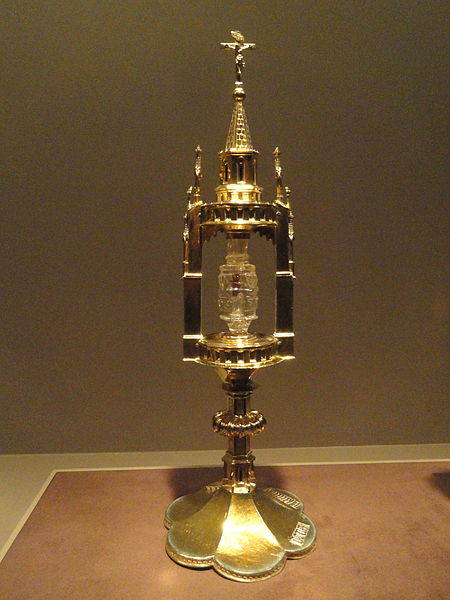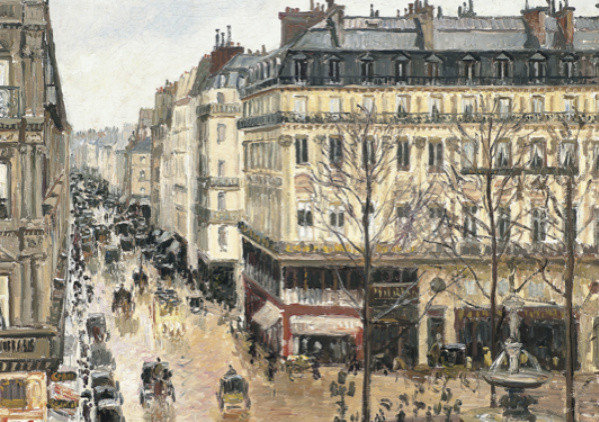The Foreign Cultural Exchange Jurisdictional Immunity Clarification Act (HR 4292) passed the House of Representatives yesterday, 388 to 4. Voting against were Reid Ribble (R, WI), Mark Sanford (R, SC), Marlin Stuzman (R, IN), and Justin Amash (R, MI). As discussed here previously, the bill would amend the Foreign Sovereign Immunities Act, 28 U.S.C. § 1605 (FSIA) to clarify when a cultural object loaned with immunity from seizure pursuant to the Immunity from Seizure Act (IFSA) can also constitute the “commercial activity” element necessary to overcome sovereign immunity and bring a suit in U.S. federal court. Invocation of the FSIA has, since Altmann v. Republic of Austria up through the cases pending against Hungary and the Thyssen-Bornemisza Collection pending today, become the go-to strategy to seek federal jurisdiction over World War II/Nazi-looted art restitution cases in particular. 
Foreign Cultural Exchange Jurisdictional Immunity Clarification Act Passes House of Representatives Overwhelmingly
Topics: Reid Ribble, Mark Sanford, Thyssen-Bornemisza Collection, Art & Cultural Heritage Law Committee of the A, Marlin Stuzman, Nazi-looted art, Foreign Sovereign Immunities Act, Malevicz v. City of Amsterdam, 22 U.S.C. § 2459, Justin Amash, FSIA, Restitution, HR 4292, World War II, IFSA, Foreign Sovereign Immunities, Altmann v. Republic of Austria, Immunity from Seizure Act, 28 U.S.C. § 1605, Foreign Cultural Exchange Jurisdictional Immunity
Cornelius Gurlitt Passes Away, Questions Remain About Recent Deal and Fate of Collection
Cornelius Gurlitt died yesterday, six months after his art collection was revealed to the world in a Focus article, and less than a month after striking a deal with Bavarian prosecutors over the 1,280 paintings and works of art seized from his apartment as part of a tax investigation. Although that brings the investigation that initially led to the seizure to an end, many questions remain about what will happen to the deal that he made, and to the works of art in Austria not covered by that deal
Topics: Focus, Bayern, Hildebrand Gurlitt, Cornelius Gurlitt, Germany, Nazi-looted art, Gurlitt Collection, Seated Woman, heirs, Entartete Kunst, stolen art, Anne Sinclair, Ersessene Kunst, Restitution, Bavaria, World War II, Süddeutsche Zeitung, degenerate art, Erben, Austria, NS-beschlagnahmte Kunst, Raubkunst, Henri Matisse, Paul Rosenberg
The Gurlitt Deal—Prosecutor Gives Collection Back, Agreement Leaves Questions About Process and Transparency
The Augsburg prosecutor for the State of Bavaria announced today that in connection with Monday’s agreement with Cornelius Gurlitt, the 1,280 works of art seized from Gurlitt’s apartment in 2012 have been “returned” to Gurlitt. Though it does not appear that the objects have physically changed locations, the state officially lifted the seizure, and now has access to the collection for further provenance research pursuant to the agreement, rather than the compulsory process by which it retrieved them.
Topics: German Ministry of Culture, Schwabinger Kunstfund, Cornelius Gurlitt, Bundesministerium für Kultur und Medien, Breslau, Augsburg, Willi Korte, London, Max Liebermann, Claude Monet, Christoph Edel, Gurlitt Collection, Ingrid Begreen-Merkel, Alt Ausee, Hildebrandt Gurlitt, stolen art, State of Bavaria, Reiter am Strand, Salzburg, Restitution, David Toren, Müncher Kunstfund, World War II, Task Force, Süddeutsche Zeitung, Freistaat Bayern, NS-beschlagnahmte Kunst, www.lostart.de, Monika Grütters, Riders on the Beach, Raubkunst, Bayerisches Staatsministerium der Justiz, Bavarian Ministry of Justice, Henri Matisse, Paul Rosenberg
Foreign Cultural Exchange Jurisdictional Immunity Clarification Act Passes House Judiciary Committee on Voice Vote
Just a week after it was introduced by Steve Chabot (R-OH), the Foreign Cultural Exchange Jurisdictional Immunity Clarification Act (HR 4292) was marked for hearing today. Three members spoke in favor, a voice vote was taken, and bill was referred favorably to the full House.
Topics: Restitution, World War II, Foreign Sovereign Immunities, Immunity from Seizure Act, Foreign Cultural Exchange Jurisdictional Immunity
Foreign Cultural Exchange Jurisdictional Immunity Clarification Act Reintroduced in House of Representatives, Would Ban Use of Exhibition Loan as Basis for Federal Court Jurisdiction
Steve Chabot (R-OH) has reintroduced the Foreign Cultural Exchange Jurisdictional Immunity Clarification Act (H.R. 4292), after a previous attempt to amend the Foreign Sovereign Immunities Act with regard to the loan of cultural objects failed to become law in 2012. The text of the March 25, 2014 bill is identical to the version that passed in the House in 2012. Its co-sponsors are John Conyers (D-MI) and Bob Goodlatte (R-VA), and it has been referred to the House Judiciary Committee.
Topics: Cornelius Gurlitt, Malewicz v. City of Amsterdam, Girolamo Romano, Gurlitt Collection, 22 U.S.C. § 2459, Christ Carrying the Cross Dragged by a Rogue, 517 F.Supp.2d 322, FSIA, Restitution, David Toren, 19 U.S.C. § 1595a, Steve Chabot, Orrin Hatch, House Judiciary Committee, 28 U.S.C. § 1605(a)(2), 28 U.S.C. § 1605(a)(3), Senate Bill 2212, World War II, IFSA, Foreign Sovereign Immunities, Altmann v. Republic of Austria, Portrait of Wally, John Conyers, Immunity from Seizure Act, Dianne Feinstein Foreign Sovereign Immunities Act, Federal Republic of Germany, 28 U.S.C. § 1605, H.R. 4292, Foreign Cultural Exchange Jurisdictional Immunity
Limbach Advisory Commission Recommends Against German Restitution of “Guelph Treasure,” Focuses on Terms of 1929 Agreement for Intended Sale
One of the issues exposed and exacerbated by the ongoing Gurlitt collection stalemate is the question of Germany’s restitution procedures with respect to art. As the Bavarian legislative proposal to abolish the statute of limitations for claims against bad-faith acquirers is considered by the Bundestag, the “German Advisory Commission for the Return of Cultural Property Seized as a Result of Nazi Persecution, Especially Jewish Property” has issued a decision over what has become known as the “Guelph Treasure” (Welfenschatz) in the collection of the Stiftung Preussischer Kulturbesitz (SPK), the Prussian Cultural Heritage Foundation. The March 20, 2014 opinion (available, so far as I know, only in German at this point at www.lostart.de) underscores the issues around claims of sales under duress, and the appropriate present-day procedural remedy. Readers should also brush up on their medieval German history to keep up.
Topics: Holy Roman Emperor Otto IV, German Supreme Commercial Court, Holy Roman Empire, Bundeshandelsgericht, German Supreme Constitutional Court, Z.M. Hackenbroch, Karl Blechen, Duchy of Brunswick and Lüneburg, Niedersachsen, Karl Ernst Baumann, Act of State, Kingdom of Hanover. Königreich Hannover, Dr Alexander Lewin, Prussia, Lower Saxony, Anselm Feuerbach, Gurlitt Collection, Foreign Sovereign Immunities Act, Preussen, Hans Sachs, German Advisory Commission for the Return of Cultu, Hessen, Fogg Art Museum, Congress of Vienna, Julius and Clara Freund, Kurhannover, Dresdner Bank, Hermann Goring, Austrian Supreme Court, Johann J. August von der Embde, House of Welf, Stiftung Preussischer Kulturbesitz, Wilhelm Leibl, Portrait of Amalie Zuckerkandl, Braunschweig-Lüneburg, Harvard, Portrait der Familie von Dithfurth, Gurlitt, Restitution, George I, J.S. Goldschmidt, World War II, Peasant Girl without a Hat and with a White Headcl, Queen Victoria, Prussian Cultural Heritage Foundation, Art Institute of Chicago, Kurfürsten, Jutta Limbach, www.lostart.de, Soviet Union, Gustav Klimt, Bundesverfassungsgericht, Welfenschatz, Limbach Commission, I. Rosenbaum, Electors
Germany Itself Exhibited in the United States Dozens of Works from Hildebrandt Gurlitt in 1956
There have been occasional references during the Gurlitt affair to the possiblity that some of the paintings seized from Hildebrand Gurlitt's apartment had been exhibited in the United States. Details have been sparse. With a copy of the out-of-print catalogue from that exhibition now in hand, however, we can start to identify the scope of this U.S. contact—and thus the basis for possible claims against Gurlitt and/or the Federal Republic of Germany by those paintings' original owners or heirs. Until the disclosures by the Gurlitt Task Force are complete, it remains to be seen which.
Topics: Schwabinger Kunstfund, Max Beckmann. www.lostart.de, Lempertz, Cornelius Gurlitt, Nolde, Gurlitt Task Force, Art Association for the Rhineland and Westphalia, Gurlitt Collection, Lion Tamer, Hildebrandt Gurlitt, Entartete Kunst, Restitution, Kirchner, Kandinsky, World War II, German Watercolors Drawings and Prints, Löwenbändiger, Kunstverein Düsseldorf, A Loan Exhibition Sponsored by the Federal Republi, Franz Marc, Large Horse, Federal Republic of Germany, Raubkunst, Zandvoordt
The Gurlitt Counteroffensive Continues: Complaint Filed for Return of Paintings
According to multiple news reports and his attorneys, Cornelius Gurlitt has filed a complaint for the return of the paintings seized in 2012 by the Augsburg prosecutor. Copies are not yet available, but the Gurlitt PR website www.Gurlitt.info" has a release that states as follows (thus far only in German). Stay tuned for developments if and when the document becomes available.
Topics: Schwabinger Kunstfund, Complaint, Nazi stolen art, Hannes Hartung, Hildebrand Gurlitt, Gurlitt Info, www.Gurlitt.Info, Augsburg, Germany, Tido Park, Gurlitt Collection, Beschwerde, Entartete Kunst, Gurlitt Facts, Beutekunst, Gurlitt, Restitution, Statute of Limitations, World War II, Derek Setz, degenerate art, Staatsanwalt, Strafprozessordnung (StPO) Paragraph 304, Soviet Union, Raubkunst, Verjährung, Münchner Kunstfund
Cassirer Heirs' Claims to Pissarro Work Revived by Appeals Court, the Year 2013 Shows that the Tide for Restitution May be Shifting Again
The U.S. Court of Appeals for the 9th Circuit restored last week claims by heirs of Lilly Cassirer against the Thyssen-Bornemisza Collection for the return of the Camille Pissarro painting Rue St. Honoré, après-midi, êffet de pluie.
Topics: Nuremberg laws, Schwabinger Kunstfund, Cornelius Gurlitt, Lilly Cassirer, California Code of Civil Procedure § 338(c), Dorothy Nelson, Thyssen-Bornemisza Collection, Julius Schoeps, Rue St. Honoré après-midi êffet de pluie, Claude Cassirer, Von Saher v. Norton Simon, de Csepel, Jacques Goudstikker, California Code of Civil Procedure § 354.3, Gurlitt Collection, Foreign Sovereign Immunities Act, Hans Sachs, Von Saher v. Norton Simon Museum of Art at Pasaden, Madame Soler, Bundesgerichtshof, Hildebrand Gurlit, Entartete Kunst, Hans-Heinrich Thyssen-Bornemisza, Hungarian National Gallery, Nazis, Munich, Deutches Historisches Museum, FSIA, Preemption, Gurlitt, Harry Pregerson, Restitution, field preemption, Marei Von Saher, Herzog collection, Bavaria, Claudia Seger-Thomschitz, Looted Art, World War II, Foreign Sovereign Immunities, Pinakothek der Moderne, degenerate art, Altmann v. Republic of Austria, 578 F.3d 1016, Freistaat Bayern, beschlagnahmte Kunst, Camille Pissarro, Kim McLane Wardlaw, Nürnberger Gesetze, Raubkunst, Museum of Fine Arts Boston, Cassirer v. Thyssen-Bornemisza Collection, verschollene Kunst, Kunstfund München
Gurlitt Vows to Fight for Art Collection, Possible Limitations Under German Law Still Unclear. Does Austria Have Say?
Der Spiegel conducted a face to face interview with Cornelius Gurlitt that was published over the weekend, addressing his intentions about the 1,400 artworks connected to Nazi looting. Most striking was Gurlitt’s declaration with regard to the artworks seized by Bavarian tax authorities “I will give nothing back willingly.” The highlights of the interview, available in both German and English (the fuller version only in print, in German), ranges from discussing Gurlitt’s reclusive existence, to his perceived victimhood, to some standard-fare denialism (like that Hildebrand engaged in the commerce of “degenerate art” nearly always sold under duress or worse only in order to “save” the art).
Topics: veschollene Kunst, Cornelius Gurlitt, Schwabinger Kunstfund. Kunstfund München, Verjährungsfrist, Legal Times, prescriptive ownership, Gurlitt Collection, österreiches Recht, Bundesgerichtshof, Hildebrand Gurlit, Entartete Kunst, Nazis, Munich, Salzburg, Gurlitt, Restitution, City of Gotha et al. v. Sotheby’s et al., Statute of Limitations, Looted Art, World War II, deutches Recht, degenerate art, Austria, München, Raubkunst, German Civil Code § 221, Österreich





